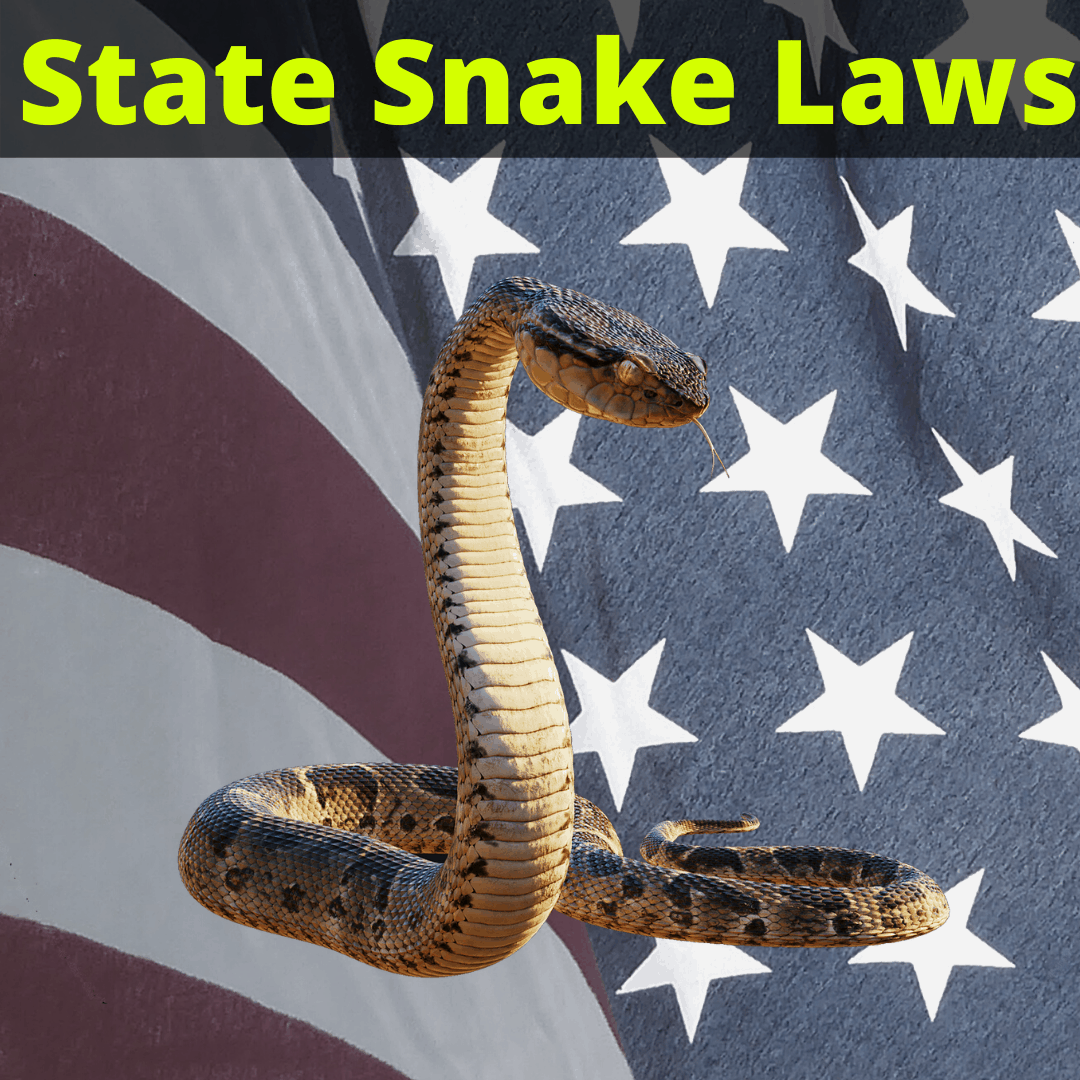
Good for you! Now just go to the pet store an pick one out, right?
Not so fast!
I’m sure you’re aware governments like to regulate. And exotic pet ownership is just ripe for regulation.
And in the United States, it goes without saying that snake laws differ from state to state. In many cases, even from county to county and municipality to municipality.
Then you have another huge legal issue to deal with: liability.
You absolutely must have liability insurance of you plan to own a snake.
Does all of this sound complicated? It should, because it IS complicated. Incredibly so.
But we’ll help you make sense of it all.
By the time you get to the end of this page, you will have a much better idea what hurdles you can expect in terms of snake laws in your state and what you need to be aware of in terms of liability.
Table of Contents
- 1 Snake Laws
- 1.1 The Reptile Community
- 1.2 Why Are There Exotic Animal Laws?
- 1.3 The Lacey Act – Acquisition Of Venomous Snakes
- 1.4 State By State Pet Snake Laws
- 1.5 Insurance Liability
- 1.6 Homeowner’s Or Renter’s Insurance When You Own A Snake
- 1.7 Non-Venemous Snake Bites
- 1.8 Venomous Snake Bites
- 1.9 Legal Steps To Take If A Bite Or Other Injury Happens
- 2 United States Snake Laws: Final Thoughts
Snake Laws
You need to know the laws in your state regarding pet snakes. While most pet snake owners have non-venomous varieties, there are some owners who prefer venomous snakes. Each breed could have its own regulations depending on the state you live in.
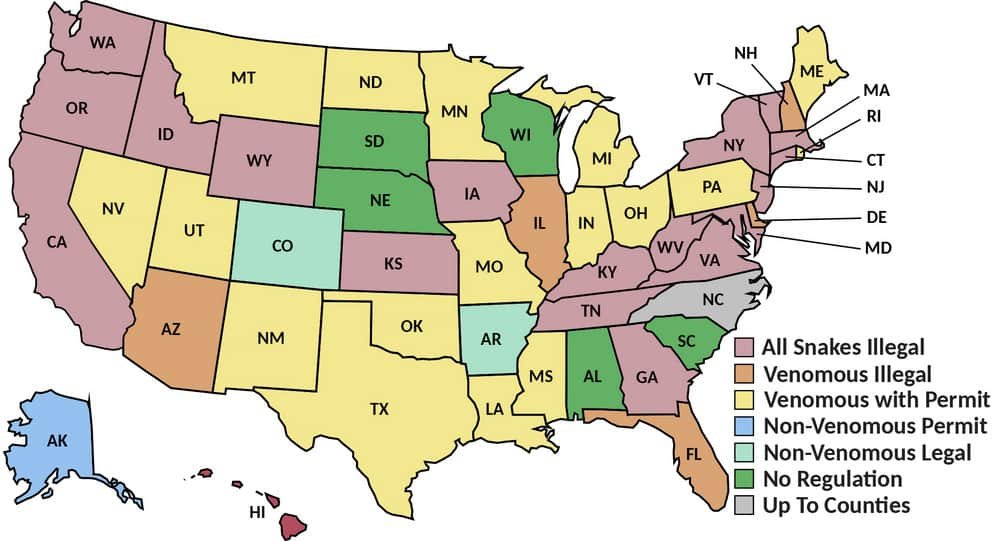
For example, in Alaska, no one can possess, sell, import or export live game animals (birds, mammal, or reptiles) that are found or in the state. In Iowa, the state exotic pet laws are pretty straightforward. You are not allowed to breed, sell, or own any non-domestic animals.
And then there are states like Massachusetts where you simply cannot own an exotic animal of any kind.
Beyond federal, state, and local laws, there is the matter of liability. How much insurance do you need and what are you liable for if your snake escapes?
All responsible snake owners need to consider every contingency when building the housing for the snake, consider possible damage the snake could do, and consider what might happen if the snake attacks someone.
Let’s start with an overview of the community and then look at the laws and the matter of liability when it comes to owning both non-venomous and venomous snakes.
The Reptile Community
The domestic reptile community consists of groups and organizations including breeders, universities, importers, retailers, hobbyists, and pet owners. People keep reptiles as pets mostly because they are fun to watch, and they don’t make noise.
There are no statistics on the exact number of reptiles owned as pets, but ownership of snakes is rising. Researchers estimate that 1.5 to 2.5 million US households owned one or more reptiles in 1996. Most of these snakes come from pet stores and owners also get their pets’ food supply and habitat supplies from pet stores.
There are vendors of reptiles in every state in America, but you find the majority in the southern portion of the United States in places like Arizona, California, Florida, and Texas. There are also a lot in the states of New York, New Jersey, Pennsylvania, Maryland, Ohio, Virginia, and Illinois.
If you must go to another state to purchase a snake, make certain you understand the federal regulations regarding the sale and transport of exotic animals across state lines (see The Lacey Act below).
Snake owners can usually find a local organization or association to belong to. There, they can meet with other owners, keep up to date on current laws or regulations, and share ideas for caring for their snakes.
This extensive network of specialists in pet snakes must first and foremost be acquainted with exotic animal laws – and for good reason.
Why Are There Exotic Animal Laws?
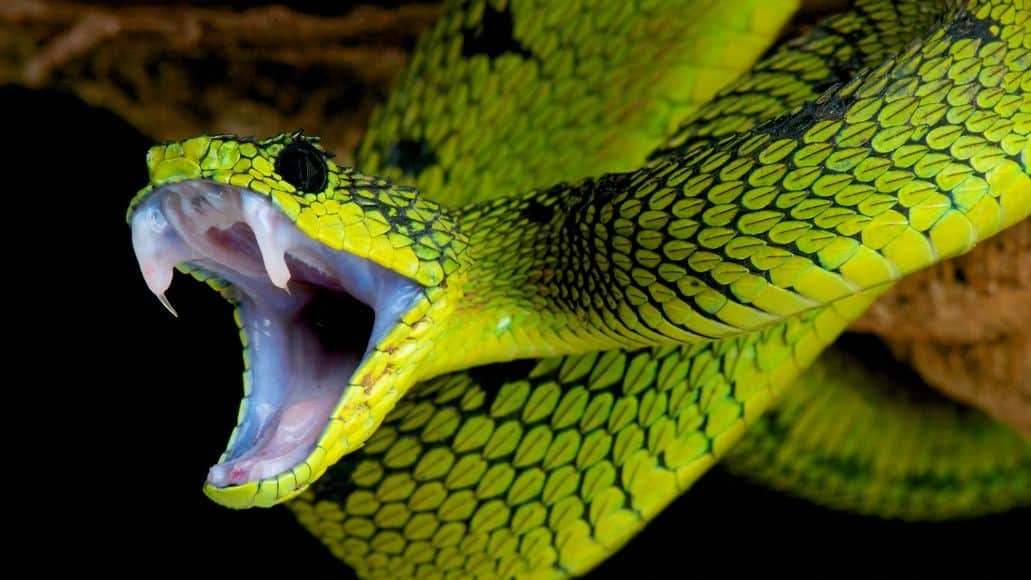
In a free society like the US, you might wonder why laws even exist regulating the ownership of pets. Don’t we have the right to own pets, regardless of the species or breed?
You might think so, but in 2011, there was a terrible incident in Zanesville, Ohio, involving more than 50 exotic animals whose owner had committed suicide after releasing the animals into the public sphere.
According to ABC news, the massacre of the exotic animals began at a disreputable wild animal sanctuary in Zanesville, Ohio, where Bengal tigers, bears, lions, and other vicious animals wandered away. Afraid that the animals would run free and terrify the residents in town, officers started killing the animals with their guns.
By the time the situation was over, 49 animals died: 18 Bengal tigers, 17 lions, six black bears, two grizzlies, three mountain lions, two wolves, and a baboon. ABC News’ wildlife expert Jack Hanna said the actions by the police stopped a catastrophe.
The remaining living animals—a grizzly bear, three leopards, and two monkeys—went to the Columbus Zoo.
If the owner of these animals had followed the law and kept the animals safely, there would not have been a need to kill 49 of them. This would have also kept the public safe. This incident proved the very real possibility that exotic animal ownership can have consequences—not just for the owners, but for everyone in the community.
While laws regarding the keeping of exotic pets have been around far longer than 2011, this incident is one example why states and localities have regulations regarding the procurement and housing of wild animals—including snakes.
The Lacey Act – Acquisition Of Venomous Snakes
The Lacey Act specifically addresses the transportation of wildlife across state lines. If you can keep venomous reptiles in your state, locality, and city, you must consider how to legally acquire them. Any purchase of animals, either from a reputable breeder or vendor, is subject to The Lacey Act.
The Lacey Act prevents someone from importing, exporting, transporting, selling, receiving, acquiring or purchasing any fish or wildlife captured, owned, moved or retailed in violation of any state law, regulation, foreign statute, or tribal Indian law.
Any wildlife transported across state lines must be in containers that properly list the sender and receiver on the outside of the container with a readily accessible list of contents ,by species and number and classifying which species are venomous.
If you acquire reptiles unlawfully and take them to different states, it is a violation of federal law. At the same time, if you acquire venomous snakes that “you know, or reasonably should have known, were taken, possessed, transported or sold in violation of state law,” you are in violation of the Lacey Act.
Violating the Lacey Act could mean civil and criminal penalties. A violation of the Lacey Act usually constitutes a felony violation, which means you lose the right to vote, hold office, own a gun, and you could spend up to five years in prison.
Once you have found a breeder or provider of snakes, and you are certain you’re not in violation of federal transportation laws, it is time to check out the laws in your state regarding the possession of snakes.
State By State Pet Snake Laws
The laws in each state are unique. Some require permits, some have no regulations, and others do not allow you to own snakes at all. Thanks to various states’ Departments of Natural Resources and, we have a comprehensive list of the requirements for each state.
| Legal Situation | States |
|---|---|
| All Snakes Strictly Illegal | California, Connecticut, Georgia, Hawaii, Idaho, Iowa, Kansas, Kentucky, Maryland, Massachusetts, New Jersey, New York, Oregon, Tennessee, Vermont, Virginia, Washington, West Virginia, Wyoming |
| Venomous Snakes Illegal | Arizona, Delaware, Illinois, Florida, New Hampshire |
| Venomous Snakes Legal With Permit | Indiana, Louisiana, Maine, Michigan, Minnesota, Mississippi, Missouri, Montana, Nevada, New Mexico, North Dakota, Ohio, Oklahoma, Pennsylvania, Rhode Island, Texas, Utah |
| Non-Venomous Snakes Legal With Permit | Alaska, Delaware, Florida, Indiana, Louisiana, Maine, Michigan, Minnesota, Mississippi, Missouri, Montana, Nevada, New Mexico, North Dakota, Ohio, Oklahoma, Pennsylvania, Rhode Island, Texas, Utah |
| Non-Venomous Snakes Legal Without Permit | Arkansas, Colorado, Illinois, New Hampshire |
| No Regulations Or Restrictions | Alabama, Nebraska, South Carolina, South Dakota, Wisconsin |
| Counties Or Municipalities Decide | North Carolina |
Each state that allows people to keep venomous and non-venomous snakes as pets has its own eccentricities. In states such as Colorado, Florida, and West Virginia, you can capture and keep species native to the state.
But in states like Illinois, Kansas, and Vermont, you can only keep venomous or non-venomous reptiles for educational or display purposes, such as at a zoo.
What is important is that you are thorough in checking the regulations and requirements not only for your state, but for your city and county. What might be legal in your state may not be allowed in your county or city. And above all, find out what the liability requirements are for keeping snakes of any variety.
Even if your state seems to have no regulation according to info you see online, like Wisconsin, things change rapidly, so always check with a lawyer or do your own research in person.
Insurance Liability
In addition to the laws of each state, county, and municipality, there are concerns over liability in case your snake escapes, causes damage, or hurts someone. For example, if you own a venomous snake, chances are your state law will require you to keep a stock of anti-venom.
Snake owners can also have a difficult time finding housing. Many rental companies don’t want what they deem to be dangerous animals in their units. There is a legitimate fear of those animals escaping or hurting other residents nearby.
In the past ten to fifteen years, there has been an upsurge in exotic pet ownership in America. As exotic pet ownership increases, an increase in attack or escape incidents will naturally occur. Since 1990, there have been over 1,000 reported incidents involving exotic pets.
If this should happen with your snake, will you be able to defend yourself? Injured victims can seek restitution for both physical and emotional damages.
Most pet owners can’t afford to pay medical bills and punitive damages should a victim take them to court. You should always consider liability insurance coverage for your pet snake as a requirement.
You will need to buy a supplemental policy that specifically covers your pet. Most homeowner’s or renter’s insurance policies will not cover exotic pets. Go through your coverage with your agent and clarify your coverage. Then review the supplemental insurance policies for exotic pets currently on the market.
Make sure you are getting liability insurance, not pet health insurance. When you are searching the internet, most results will be for pet health insurance. You need liability coverage for your specific exotic pet. This type of insurance covers any gaps your homeowner’s or renter’s insurance may not cover.
Homeowner’s Or Renter’s Insurance When You Own A Snake
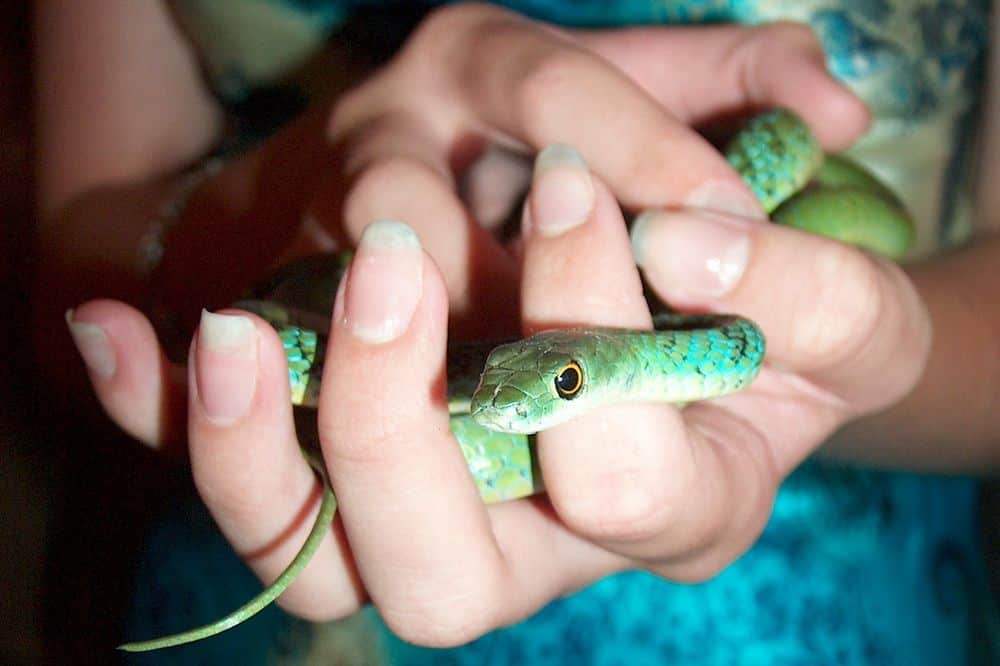
When you are ready to purchase a pet snake, consider the conversation you will be having with your homeowner’s or renter’s insurance agent. Whether you own a snake or are planning to get one, make sure you pay attention to these three points.
Be Honest
When you are shopping for homeowner’s or renter’s insurance, agents will ask whether you have any “exotic” or “dangerous” animals. With snakes, this is a judgment call.
Is a venomous snake dangerous? Yes, definitely. Is a boa constrictor? It certainly can be. Rat snakes and garter snakes? They can bite you, but the most you’ll get is a scratch.
Snakes can be classified as “aquarium pets” since, technically, they are. But you must consider what type of snake you have, how dangerous—or not—it can be, and whether or not you are comfortable classifying it as an “aquarium pet”.
Keep in mind, all the insurance in the world won’t help if you classify your cobra as an “aquarium pet” and it kills someone.
Consider The Snake’s Habitat
Most insurance companies aren’t as concerned with you having a pet snake as they are with its habitat. Underwriters will ask if the snake is living in a secure container and how often the snake might be taken from its habitat.
If a prospective policyholder plans to take the snake from its enclosure, insurance carriers will rightly be concerned from a liability perspective and may not write a policy for the pet.
Be Aware Of The Big Picture
Safety is priority number one. Don’t put yourself or others at risk just to get home or renter’s insurance.
But what happens if your snake does bite?
Non-Venemous Snake Bites
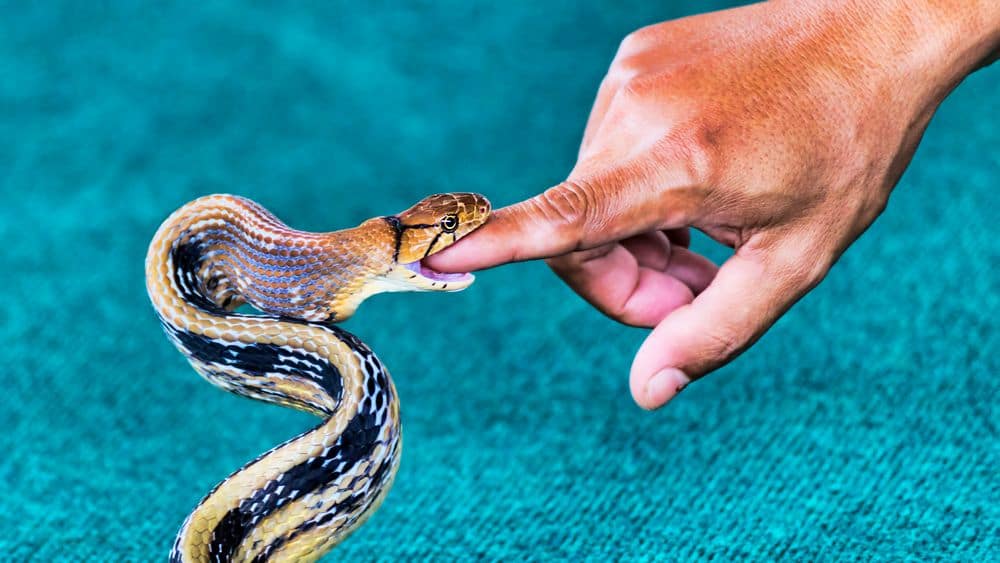
So, what should you do if a bite occurs?
Corn snakes, king snakes, rat snakes, and garter snakes are the most common non-venomous snakes kept as pets. But that doesn’t mean they can’t or won’t bite.
Like any other animal taken out of its natural environment, they can be scared or startled by sounds or lights that we would ignore. It is this propensity that drives the laws regarding snake ownership.
The majority of non-venomous snakes kept as pets are gentle and do not typically bite their owners unless provoked. But any species can bite without warning when startled or overly hungry. Snakes can also be more short-tempered and inclined to bite when they are shedding or don’t feel well.
Should your pet snake bite you or someone else, first treat whomever your snake has bitten. Clean the wound thoroughly with antiseptic soap and warm water. Flush out areas of broken skin with lots of water for several minutes and apply pressure if the wound is bleeding.
Call a doctor to get advice about specific medical treatment. Even non-venomous snakes carry various bacteria, including Salmonella. You must take steps to prevent infection.
After treating the wounds, make sure your snake is contained safely within its habitat and ensure it is not sick or hurt. Some snakes are naturally aggressive and more apt to bite. Take extra precautions with such breeds.
Always be aware of your pet’s mood before you try to handle it, and never let your guard down. Even happy, satisfied snakes can be surprised and bite. Don’t allow others who may be nervous or scared handle your snake.
If you are careful and take the proper precautions, snake bites are not usually common.
Venomous Snake Bites
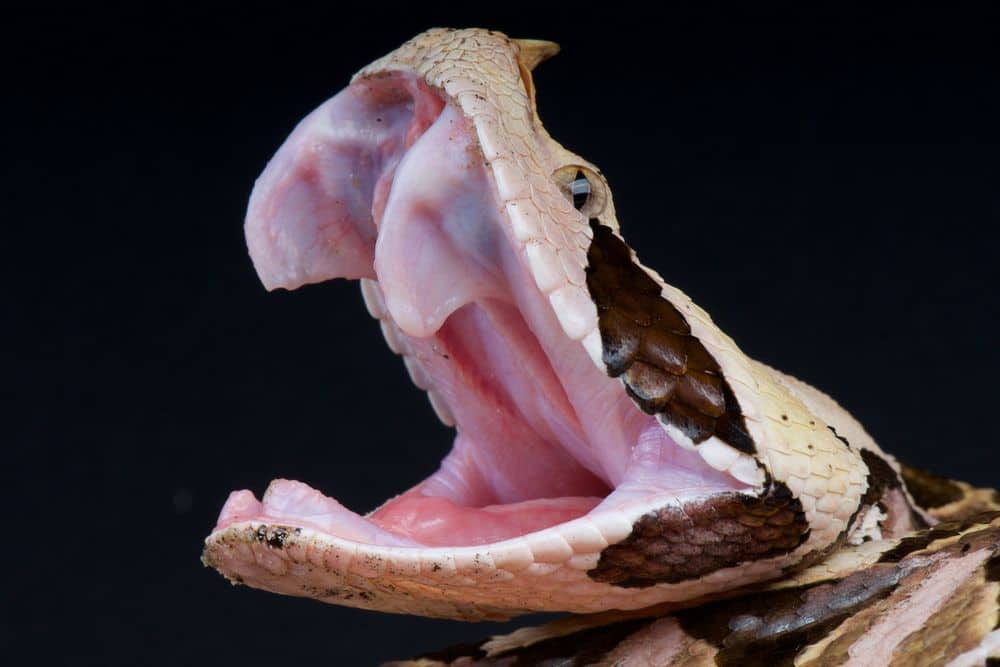
Venomous snake bites look no different initially than non-venomous bites. But the severe consequences that sometimes follow can be dire. Treatment for a venomous snakebite is cost prohibitive, extremely painful, and can cause permanent injury or even death.
After initial treatment, it is often necessary to remain in the hospital for up to 24 hours for close monitoring. If blood pressure falls, IV fluids can be necessary. If there was massive blood loss, a transfusion may be necessary.
24 hours of monitoring is necessary because some people can have a severe allergic reaction to antivenom. Recovery time will completely depend on the type of snake bite. Recovery generally takes one to two weeks, but a severe reaction to the venom could prolong recovery to as long as nine months.
This is why liability is the most important legal concern for those who keep venomous reptiles as pets. By their nature, venomous snakes always have the potential to harm people, including their owners.
It is absolutely foolish to keep venomous reptiles without liability insurance. But, if you cannot afford the insurance, you most certainly should not keep venomous snakes.
The cost of treating venomous snake bites runs into the thousands. And that number goes up exponentially if the victim should go into respiratory or cardiac arrest due to the venom.
If you are the owner, your health insurance should cover the treatment. But if your snake bites someone else, you will be on the hook for their treatment.
That is why owners of venomous snakes must carry liability insurance. When you get a liability policy, the coverage will vary. But you should make sure it covers all medical expenses and court costs should your snake bite another person.
Legal Steps To Take If A Bite Or Other Injury Happens
There are multiple considerations when it comes to liability for a snakebite.
If you own a pet snake and it bites a visitor to your home, your first responsibility is to ensure the victim receives medical treatment, up to and including calling an ambulance. Even if your pet is non-venomous, it is still a good idea to take the victim to a doctor right away. If your pet is venomous, provide immediate medical care.
Venomous snake owners should always be prepared with anti-venom and know how to properly administer it. If you have people who help you care for the snake, they should also know how to administer doses of anti-venom and the steps to take after administering the dose.
Once your bite victim is in the hands of medical professionals, contact your liability insurance agent to see what steps to take next. It is in your best interest to not speak to anyone about the incident. Simply provide a statement and medical documentation for the purposes of a claim.
In most states, snakebite victims can sue you for cost of medical treatment and any costs related to long-term care or permanent damage to their health.
If you own a venomous snake and a bite victim dies, you will be liable not only for the medical costs, but the family could sue you for punitive damages. And those could spiral into the millions.
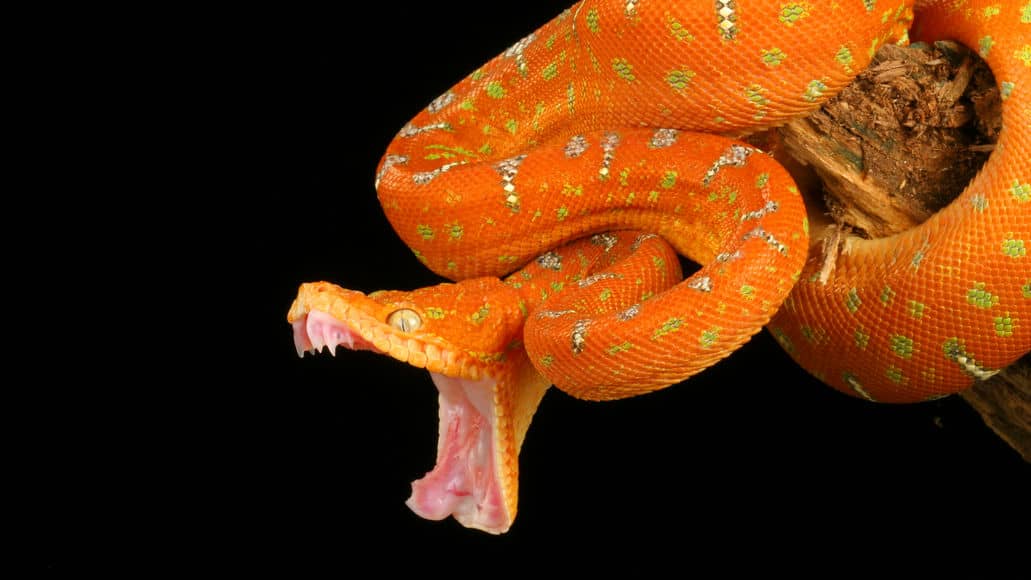
Your liability agent will guide you in each step of the process. He or she will meet with you, go over paperwork, let you know what you need to provide, and offer advice regarding potential legal actions.
These are all things to keep in mind when you are first considering owning a venomous snake as a pet.
United States Snake Laws: Final Thoughts
While snakes can be terrific pets for any number of reasons, all responsible pet snake owners must be aware of the laws and regulations that govern snake ownership.
Obviously, non-venomous snake owners have fewer laws and regulations to follow, and fewer liability issues to consider. A bite from a non-venomous snake is usually little more than a minor nuisance that any snake owner can handle themselves.
Owning venomous snakes is another matter entirely.
If you own a venomous snake, or are considering it, you must abide by far stricter standards, be aware of the need to get a permit, and stock antivenom in your home. The fact is, most venomous snake owners have their snakes for educational purposes or as breeders. Of course, there are also those who simply love snakes.
A comprehensive review of local, state, and federal laws is essential before you buy a snake. You can not rely on this article or other sites you find on the internet. Laws are complicated and always changing.
You MUST research all applicable laws in your area on your own, or with the help of a lawyer. You must also find adequate liability insurance to protect yourself in case your snake escapes or bites someone.
A snake can certainly be a great pet, but make sure you stay within the boundaries of the law and have the insurance needed to protect yourself and others.
Of course, if you are underage and you want a snake, local laws are just the first hurdle. The bigger challenge will be to convince your parents to get you a snake. That article will help with that hurdle.
Virginia says
Are these the current laws, governing pet snake ownership.
Gordon Wilson says
Should be, but laws are always changing. You definitely want to research your local and state laws, if you’re thinking about getting a snake.
Zack says
No. They’re terrible information. For instance, I’m sure that the ONLY state banning reptile keeping is Hawaii. And yet there were several states listed as banning all. Additionally, while everyone SHOULD be mindful of their liabilities, liability insurance is not required in most states, counties, or towns. And yet, that was promoted as fact.
Doug says
They are not even in the ballpark of being accurate. California never had a ban on owning snakes nor does it now. Neither do many of the other states listed. This is the worse reference I’ve ever seen. Completely inaccurate.
KK says
This entire page is a bunch of baloney 😂 Nonvenomous pet snakes are legal in ALL states, except Hawaii. I have no idea what the writers of this page are on! For the REAL laws, visit your local fish & game department’s site.
And there is no “liability” if a visitor to your home gets a bite from your snake. All reptiles can bite, period. If you’re not willing to risk being bitten, don’t touch anyone’s reptiles. It’s not hard to do. Just don’t be a crybaby if it happens.
Steve says
This web site should be taken down immediately. It is not accurate at all. There are probably a million pet snake , lizard and turtle owners that know this is a lie. I have been breeding and keeping reptiles in both California and Arizona as well as going to reptile shows around the country for the last 50 years to know that this is bullshit.
Fred says
This is not accurate. Washington, Iowa and Kentucky you can own a snake. Washington and Kentucky also make exceptions for hog nose snakes, Washington is more generalized allowing rear fanged snakes.
Gordon Wilson says
Thanks for the update!
KK says
You can own snakes in all states except Hawaii. Most of this page is wrong,
Terri says
Virginia it’s legal to own snakes but if they are considered indigenous to the state then there are requirements to only be allowed to own (for instance corn snakes) up to 5 as a pet only but if you’re a breeder and sell them or have more than 5 you must get a permit/license to own more or to bed and sell them but for you to say all snakes are strictly illegal is totally incorrect and you need to correct that. The same goes with California laws. You really should check the laws more carefully before posting the legality of owning exotic pets in any state unless you’re posting their actual written laws instead of your interpretation of said laws.
Gordon Wilson says
Thank you for the additional information. Unfortunately, it is impossible to go into this much detail on every individual state in an article like this, which is exactly why anyone considering getting a snake should never rely on what they read on the internet. Articles like this can give you a broad idea, but you MUST thoroughly research all applicable laws in your location.
Daniel says
I live in Georgia. It is illegal to own native species of non-venomous and non-native venomous snakes here. However it is perfectly legal to own non-native, non-venomous and native venomous snakes here in Georgia. You state that all snakes are illegal here and then when someone corrects you, you basically respond with “don’t believe everything you read on the internet, do the research yourself.” This is supposedly a site that is dedicated to educating people about snakes and yet you are telling bold-faced lies and spreading false information. Quit making generalizations that are clearly not true, you are spreading misinformation and if people are saying “this isn’t true” and you refuse to correct your mistake, then you are deliberately lying to the general public about such misinformation. Either edit the article so that misinformation doesn’t spread or do nothing and willingly admit to deliberately spreading false information and tarnishing any credibility you think you have on the matter. If this site is truly about educating the general populace about the legality of snake ownership in each state, prove it by correcting your mistakes or become part of the problem.
Gina Lee says
I live in Georgia and owned a ball python for almost 17 years. I adopted another ball python from Georgia Reptile Society Adoptions and Rescues in January 2019. Ball pythons make good pets. Mine is family!
Miranda says
Then stop posting ALL SNAKES ILLEGAL. Post the truth, which is SOME. It’s really not that hard.
Andrew says
I don’t think there are any states that have a blanket ban on all snakes, so that graphic isn’t very accurate. Even in New York City, which does ban all in the Pythonadae family (rather idiotically, as this includes such snakes as the Ball Python and Children’s Python, both of which are substantially less of a threat than, say, a pit bull, which could literally kill you, but remains legal), Garter snakes and corn snakes, for instance, are not banned, and there is no general ban on Colubridae. But outside New York City, Ball Pythons are legal in New York State, and in most places in the US. But I really don’t think any US State bans corn snakes. If you can find any legislation to that effect, let me know, but I’m pretty sure this is just very inaccurate. I don’t know where this notion came from. The only state that might ban all snakes is Hawaii, due to concerns of introduction of invasive species.
As for liability insurance, while that might make sense for hots, unless people get them for dogs it wouldn’t make sense to get it or really worry at all for anything the size of a Ball Python or smaller. I’ve had much worse injuries from cats than I have from my Ball Python. And my Python has only bitten me in its cage when it thought it was being fed, and has never bitten me outside whilst handling, even while manhandling her for medical reasons and poking her with antibiotic shots, whereas my cats have viciously scratched and bit me for simply petting their belly.
Many landlords do discriminate against tenants with reptiles, but the fears are largely unfounded, as most breeds of dog pose much more danger to someone than the most commonly kept species of snakes. These snakes also don’t cause potentially life threatening allergic reactions in anyone, shedding dander that can extremely difficult to remove and can leave a place potentially uninhabitable for good for people with severe allergies. If a Ball Python escapes, the worst it can do is trigger a primordial fear response in someone, but that fear has no basis in reality. A Ball Python is literally physically incapable of killing anyone, save possibly a very newborn infant, but as a newborn is far too large for that snake to consume, it is very unlikely to attempt this. And this is theoretical; no Ball Python has killed anyone on record.
Even the constrictors that do pose a threat to adults very seldom actually kill anyone. You are far, far more likely to be killed by a dog, and not just because dogs are more common. Snakes are very bad at attacking multiple targets, and having another competent adult present basically ensures that a large snake will not be able to kill you, and these big snakes generally have predictable behavior and are easy to read. Meanwhile, pitbulls have killed owners and children with little to no warning or provocation, as have other dog breeds.
Hots, or venomous snakes, are of course another subject entirely. It’s literally an entirely different animal. It’s almost as different as owning a housecat and a mountain lion. I’m not sure there’s much utility in talking about owning “snakes” generally, since the kind of experience and the type of the person needed to keep a ball python is worlds apart from the one who wants to keep a King Cobra, or even a Green Anaconda. I don’t think they should be remotely equated, just like we don’t talk about “cat owners” including domestic cat owners and tiger owners. Snakes are just far too broad a group. A lot of things discussed here are only relevant to a very small subset of people that own snakes. I think there should be stronger distinctions between the types of snakes owned.
Thank you for coming to my TED talk.
Francis says
While I appreciate the TED talk… can you stop using Pit Bulls as your example? They are NOT the dangerous breed everyone thinks they are. German shepards, LABRADOR RETRIEVORS, and small dogs all have higher bite rates than Pitties.
As someone who owns snakes and Pitties, and I will defend both with my dying breath… I’d worry more about my Hognose killing someone before my Pittie. And my hoggie is still the size of an earthworm.
Dogs are no different in that they have signals. If you know how to read a dog’s body language, you can prevent A LOT of things.
small dogs, Labs and Shepards have higher bites and attacks on kids and adults than pitties because people assume that they are “good family dogs” and they just ‘wont bite’ so they dont watch for cues or supervise the dog with the kids. They let the kids climb on the dog, pull the dogs ears/tail, hit the dog (without correcting to be gentle) but expect the dog to put up with it and not get defensive. Pittie owners are NOT like this. We are highly attuned to our dog’s cues as well as dont tolerate nonsense. My Pittie is muzzled around new people and out in public because it keeps people away from us. People dont let their kids run up to the strange dog and pet it without permission. My ChihuahuaX has lost it because a 10yr old bounded down a petsmart aisle at him. Kid ran full force toward us, and then jump down to a squat in front of my dog and reached his hand over my dogs head.I immediately picked him up off the floor, completely appalled at the situation. kids mom lost her shit when my dog was growling… “you shouldnt take your dog to public places if hes not friendly’. Poor dog was practically convulsing in my arms. I lost it on her, had to cut my shopping short and leave immediately.
alternatively we were at petsmart last week and from about 10 feet away a woman asked if her 5yo could pet my ChiX (same dog). We walked up to them, and he walked right up to the little girl let her pet him without a problem. Its all in the approach. Their behavior is easily predictable if you know your animal AND PAY ATTENTION. The problem with most dog owners is that they just DONT pay attention nor do they know what to pay attention to.
Miranda says
It’s illegal in Georgia to own a corn snake. Any non-venomous species of snake that is native is illegal here. This includes corn snakes, rat snakes, and garter snakes, which are all commonly kept as pet snakes.
TC says
Why are you publishing this crap?! So much misinformation. As evident in many of the comments, I can point to at least a dozen states you totally got wrong in regards to the possession of misinformation. Quit disseminating false information!
John says
You probably want to remove that regulations map. A few of the states are incorrect. California and Oregon, for one… All nonvenomous snakes are legal without permit or regulations here, minus a couple random species like vine snakes and water snakes. All native rattlesnakes are also legal to keep without permit in California. You can even catch two rattlesnakes a day from the wild and keep them, and that is legal.
MC says
This guide is absolute garbage. There are no states where all nonvenomous snakes are illegal, for example.
Brad says
This is not even close to accurate and should be taken down or corrected. People who are looking for accurate information on such a misunderstood animal should not be misled (even unintentionally) by false made up articles.
Doug says
This is the biggest load of misinformation I’ve ever seen. Utterly inaccurate. Non-venomous snakes are not illegal to keep in California at all. In fact rear fanged snakes can be kept without any permits. Epic Fail. Venomous snakes are legal in Florida with the proper permit.
Joe momma says
These are not correct. I live in Kansas and this is way wrong.
MatCat says
The information posted for Oregon is incorrect, there is a list of prohibited and allowed snakes, Oregon actually explicitly allows a pretty good number of venomous snakes. Please see Chapter 635 Division 56, 635-056-0050 covers what is prohibited, and 635-056-0060 covers what is PERMITTED, but I will go ahead and provide the list here of what is PERMITTED in Oregon:
(c) Order Squamata (Suborder Serpentes):
(A) File snakes — Acrochordidae — All species;
(B) Pythons and Boas — Boidae — All nonnative species;
(C) Milk, Pine, Corn, Rat, Garter snakes — Colubridae — All nonnative species except Boiga irregularis, Lampropeltis getula, L.zonata, and Pituophis catenifer;
(D) Kingsnakes and gopher (bull) snakes — Colubridae — Individuals of Lampropeltis getula, L. zonata and Pituophis catenifer that are morphologically distinct from native species.
(E) Egyptian cobra — Elapidae — Naja haje;
(F) Black & white cobra — Elapidae — Naja melanoleuca;
(G) Indian cobra — Elapidae — Naja naja;
(H) Red spitting cobra — Elapidae — Naja pallida;
(I) King cobra — Elapidae — Ophiophagus hannah;
(J) Bush vipers — Viperidae — Atheris All species;
(K) Gaboon viper — Viperidae — Bitis gabonica;
(L) Rhinoceros viper — Viperidae — Bitis nasicornis;
(M) Horned vipers — Viperidae — Cerastes All species;
(N) Rattlesnakes — Viperidae — Crotalus aquilus, C. basiliscus, C. durissus, C. intermedius, C. polystictus, C. pusillus, C. tortugensis, C. triseriatus, C. unicolor, and C. vegrandis;
(O) Saw-scaled vipers — Viperidae — Echis All species;
(P) Bushmaster — Viperidae — Lachesis muta;
(Q) False horned vipers — Viperidae — Pseudocerastes All species;
(R) Pygmy rattlesnakes — Viperidae — Sistrurus miliarius and S. ravus.
Zack says
I’ve been under the impression the PNW was just out for me! Dang!
Henry says
I am a reptile keeper and breeder in Iowa and the only snakes that are illegal to own are reticulated pythons, green anacondas, african rock pythons on the state level at least. now on the local level some cities have what’s called the 6 foot rule which is that you can own any non-venomous snake up to 6 feet long. whereas some cities like davenport where I live you can literally own a burmese python since they aren’t on the states banned snakes list. but there is one city where you can’t own any constricting snake and that is cedar rapids and I never plan on moving there because of that. so as you can see the snake laws in Iowa are very complex they are legal but which ones are legal depend on your local city laws.
Curious says
Do you sell in Davenport?
Nick says
I’m from Dport but love elsewhere now in eastern Iowa, there’s a lot of breeders here, Iowa City, Cedar Rapids etc. Let alone in IL. And a convention that happens in Davenport a few times a year that’s a great time, done by ShowMeSnakes which is clean and I’ve got a couple animals there.
jon says
This is by far the most inaccurate list i have ever seen, disregard what this pages is telling you and check your state laws. Do not use this page as a credible reference, its complete garbage written by some one who did zero research and clearly has no idea what he/she is talking about.
Nick says
Seriously, this should be taken down or heavily altered. It’s horribly inaccurate. And it’s the first thing that came up on a search for snake laws.
Frank Nichols says
This information is completely inaccurate on the laws regarding snake ownership in the U.S. All states but Hawaii allow pet snakes, yes there is a restriction on certain species, but this is an individual, state, county, and municipality control. Rental properties will have their own rules and regulations. Check the laws in your locality, regarding snake possession laws.